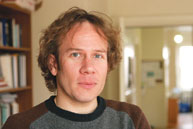Medical ethics beyond the soundbite
Medical ethics beyond the soundbite McGill University
User Tools (skip):
Medical ethics beyond the soundbite
Bioethics seen as tool for meaningful change
In the field of western medicine, diagnostic and treatment technologies are developing at breakneck pace. We seem to be engineering solutions quicker than we can fully understand their implications. And, typical of any period of rapid change, sensational questions abound: Should we streamline cloning techniques? Should cloned animals be introduced into the food chain? How old is too old to have a baby? Should stem cell treatment be developed in our research facilities? Indeed, can we even lose time debating ideas like stem cell research for fear of falling behind foreign research facilities that have already embraced the technology?

Leigh Turner received his PhD in Religion and Social Ethics from the University of Southern California in 1996.
Owen Egan
While these topics make for catchy headlines and are scrappy fodder for dinner-party conversation, some specialists doubt their relevance for the majority of the world's population. "I am concerned that too many scholars working in bioethics address sexy, hi-tech issues related to genetics and biotechnology rather than exploring ethical issues that affect millions of individuals around the world," says Leigh Turner, professor in the Department of Social Studies of Medicine and the Biomedical Ethics Unit, which was established in 1996 as a multidisciplinary unit in the Faculty of Medicine. He is also the director of McGill's master's Specialization in Bioethics.
"My work focuses on ethical issues in end-of-life care, the way in which religion and culture shape attitudes toward death and dying, clinical ethics, and ethical issues related to biotechnology. More recently, I've moved into the study of global health ethics. I'm particularly interested in studying ethical issues related to medicine and health care in impoverished, developing societies."
For Turner the greater good can be achieved not by focusing on the technological implications of bioethics but instead on the social implications. "I'm trying to get bioethicists more interested in international, transnational, or global issues. I would like scholars in this field to be less focused on the soundbite of the moment."
Bioethics can also be a tool for social justice. "I'm particularly interested in promoting better access to low-cost medications in developing societies, promoting health-related research that addresses problems facing communities in developing societies, and getting bioethicists to think less about medicine and more about the many social determinants of health."
The bioethics program offers courses on theory, research ethics, law and health care, religion and medicine, and ethics and genetics as well as a practicum. Students look at practical ethical issues through topics such as informed consent, physician assisted suicide, end-of-life care, ethics of biobanks, organ transplantation and prenatal genetic testing.
As director, Turner strives for an international scope. "I am trying to develop an approach to bioethics that is more cosmopolitan and less oriented toward ethical issues emerging within wealthy societies such as Canada and the United States. I'm especially interested in trying to address inequalities in health." After all, there are millions of people worldwide who can't afford basic medicine much less be concerned with cloning.

